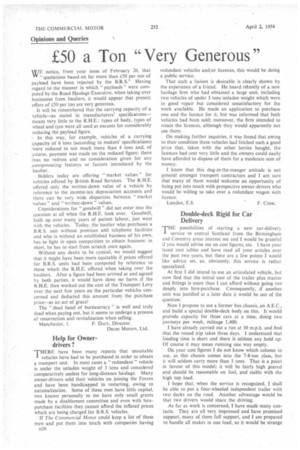WE notice, from your issue of February 26, that "
Page 60

If you've noticed an error in this article please click here to report it so we can fix it.
"quotations based on far more than £50 per ton'of payload have been rejected by the B.R.S." Having regard to the manner in which " payloads " were computed by the Road Haulage Executive, when taking over businesses from hauliers, it would appear that present offers of 150 per ton are very generous. It will be remembered that the carrying capacity of a vehicle—as stated in manufacturers' specifications— meant very little to the R.H.E.: types of body, types of wheel and tyre were all used as excuses for considerably reducing the payload figure.
In this way, for example, vehicles of a carrying capacity of 6 tons (according to makers' specifications) were reduced to not much more than 4 tons and, of 'course, payment was made on the reduced figure: there was no redress and no consideration given for any ;compensating features or factors introduced by the haulier.
Bidders today are offering "market values" for vehicles offered by British Road Services. The R.H.E. offered only the written-down value of a Vehicle by reference to the income-tax depreciation accounts and there can be very wide disparities between "market values" and " written-down " values.
Considerations for " goodwill " did not enter into the question at all when the R.H.E. took over. Goodwill, built up over many years of patient labour, just went with the vehicles. Today, the haulier who purchases a B.R.S. unit without premises and telephone facilities and who is without an established business of his own, has to fight in open competition to obtain business: in short, he has to start from scratch once again.
Without any desire to be cynical, we would suggest that it might have been more equitable if prices offered for B.R.S. units had been computed by reference to those which the R.H.E. offered when taking over the hauliers. After a figure had been arrived at and agreed by both parties, it would have done no harm if the R.H.E. then worked out the cost of the Transport Levy over the next few years on the particular vehicles concerned and deducted this amount from the purchase price—as an act of grace!
The "dead hand of bureaucracy" is well and truly dead when paying out, but it seems to undergo a process of resurrection and revitalization when selling.
Manchester, I. F. DACE, Director.
Daces Motors, Ltd.








































































































